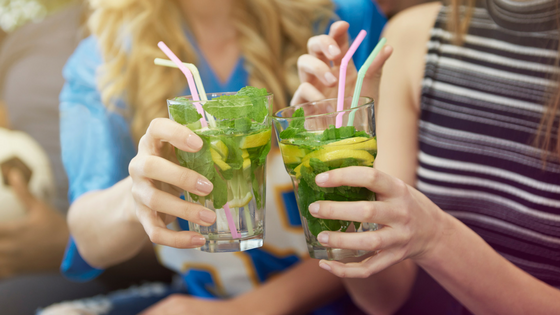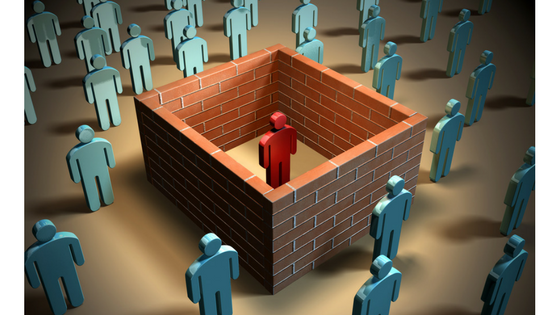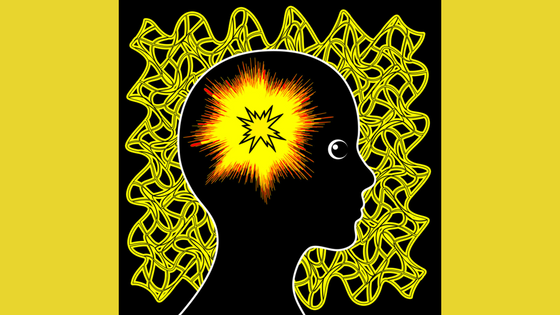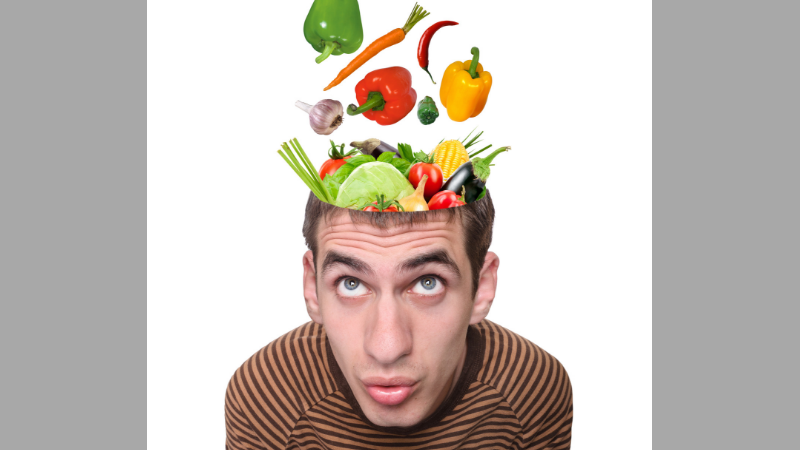How I Changed My Relationship with Alcohol
I knew it was time to change my relationship with alcohol when I woke up in a pool of my own vomit. The smell overwhelmed me, and I struggled to sit up.
Peeling the bedsheet off my face, I had no memory of puking the night before. But I did know I got very, very drunk.
It was the last straw.
The History of My Relationship with Alcohol
I’d never been a “drinker” in the traditional sense. My drinking consisted of nights out with my girlfriends, special events, family dinners, business conferences. I never felt a compulsion to drink, never felt that pull to get “buzzed” or drink away my worries.
There were only two times when I intentionally went out to get blottoed, and both of those were times when I had friends with me, and we’d had truly awful days and just needed to leave them behind.
I’m not an alcoholic. I’ve never attended meetings, 12-step programs, gone to an addicts meeting, or treated for alcoholism. No DUIs, nothing in my story matches what you might expect.
And yet, my drinking was still a problem. My relationship with alcohol was not OK.
Alcohol Was a Coping Mechanism
Coping skills are funny things. Some we learn intentionally; some we stumble upon; others we aren’t aware exist.
As part of my rmentgal health ecovery journey, I realized that I have coping mechanisms I developed to help me handle pain, sadness, anger, and other emotions.
One of my biggest was compartmentalization, a coping mechanism I still fight today. I compartmentalized my life, my career, and my friends, little islands I visited depending on what I wanted or needed at that moment.
Compartmentalizing allowed me to hide from myself the pain, sadness, or other emotion I felt in another area of my life. I would drift away from that island, headed for one that appeared more interesting or attractive at the moment.
[Survivalism] was — and still is — a heads-down approach that ignored the world crashing around me and focused on the little I could control.
Learning to integrate the many facets of my life into a single whole is a real challenge, especially when a difficulty arises.
Survivalism Didn’t Help My Relationship with Alcohol
Even bigger than compartmentalization, however, was survivalism.
In survivalism, the operative word was “just.” “Just make it through this,” “just get this one task done.” It was — and still is — a heads-down approach that ignored the world crashing around me and focused on the little I could control.
In small doses, survivalism is an excellent coping skill, but I took it to extremes.
I lived too much of my life in survival mode, primarily caused by my bipolar disorder and boosted by the trauma I’d experienced as a child and young adult.
Repeated exposure to survivalism changed it from being a coping mechanism to an approach to life. Every day became task-oriented. Emotions were left by the wayside, dangerous and disruptive.
Most of the time, my daily tasks focused on surviving whatever crisis my bipolar most recently initiated — typically financial, but also frequently relational as I would have catfights with girlfriends or sabotage my latest romantic relationship.
And thus, the drinking became an issue. When I went out drinking with girlfriends, drinking was the task. What do you do when you drink? You drink.
And so, these nights out were, for me, focused on always having a drink in hand.
Repeated exposure to survivalism changed it from being a coping mechanism to an approach to life
The nightclub scene was unfamiliar and uncomfortable for me; I never understood the underlying etiquette behind catching the bartender’s attention, safely negotiating dancing or talking with a strange man.
The lights, the loud music, the occasional fog machine, and the crush of the crowds overwhelmed my senses at a time in my life when I was already especially vulnerable and raw.
As a result, I never learned the art of sipping a drink. I wasn’t throwing back shots and Cosmos at a crazy rate, but if I finished a drink, it was time to get another.
The only time I got relief from this experience was when I had the role of designated driver, and that carried its own challenges.
The times I was most miserable, alcohol was involved. The times I was the most broke, the most hurt, the most anything: alcohol was present.
The worst times were the annual girls’ trips to Vegas when we would get bottle service. In my head, buying a bottle meant that we had to drink the entire bottle at the club.
If there were four of us and we bought a bottle of Grey Goose, it was my obligation to drink at least a fourth of it.
Inevitably, that devolved into a complete drunken stupor for me, one that nearly always ended in asking for a cigarette from someone, anyone, who could provide one and then promptly lighting it on the wrong end.
I reeled with the certainty that I needed to change my relationship to alcohol, and unsure what that meant.
The older I got, the more I started to see a pattern emerging around my relationship with alcohol. The times I was most miserable, alcohol was involved. The times I was the most broke, the most hurt, the most anything: alcohol was present.
Not as a coping mechanism, but as the Iago who magnified the circumstances already present in my life.
And now, here I was: peeling vomit-covered sheets off my cheek and done with the whole experience. Between brief bouts of vertigo, I verified my instincts, reviewing memories of drinking and their association with various times of my life.
I reeled with the certainty that I needed to change my relationship with alcohol, unsure what that meant.
Small Changes Led to Big Success
I retreated for a few days into quiet, reviewing options to change my relationship with alcohol and determining how realistic they were. I knew I needed to do better, but what was better?
My husband, then my boyfriend, was an aid to this. He doesn’t drink. Not for any moralistic or religious reason, but simply because he doesn’t like the taste and because his body metabolizes it so quickly that he just turns red and gets hot.
There was no pressure to drink on dates, no visiting bars for a nightcap. I had the occasional glass of wine or Lemon Drop when we went out, but that became increasingly less common as I became comfortable with my new habits.
Family events, too, became easier to handle. My husband became an excuse to have water or soda over appetizers, and then I might have a glass of wine with dinner. There was something in the choice to partake that made it easier to deny the drink.
The toughest to change were work conferences. I worked in Sales, and we held the conferences twice a year. It was my role to organize them, and my boss was clear: we needed to go bar-hopping on at least two of the nights.
Avoiding alcohol in stressful situations became paramount to my ability to work and function during a migraine cluster.
I learned to change my role within them and not be the last one back at the hotel from the bars. Determined to change how much I drank, I finally learned how to sip my drink, eventually able to nurse my way through just one for the night.
I learned the “Irish Goodbye,” melting away from the group at an early hour.
The final step in this experience was the vestibular migraines. Triggered by caffeine (hello, decaf coffee!), alcohol, blue-light exposure, or extreme stress levels, I would get dizzy, exhausted, and occasionally even a solid case of the spins.
Avoiding alcohol in stressful situations became paramount to my ability to work and function during a migraine cluster.
It wasn’t until after my diagnosis of Bipolar Disorder II that I learned the importance of avoiding alcohol in my long-term stability.
Alcohol is a known trigger for both depressive and hypomanic cycles, which is why it consistently associated with bipolar-induced crises in my life. It exaggerated the experiences I was already having, amplifying and worsening them.
Now, I very rarely drink. Thanksgiving this year was the first time I drank in several months, and it was only to have a couple of sips of wine at dinner. It was a way for me to feel a part of the family and traditional experience without risking myself.
I may have a drink at Christmas, and then after that, I probably won’t drink again until Easter — if then.
Alcohol is a known trigger for both depressive and hypomanic cycles.
The longer I go without drinking, the more normalized it feels for me. The less I feel like I’m on the outside. It makes it easier that my family accepts my choice and that my husband is a non-drinker, as well.
Even without that, though, I think I would still be in a similar place in my life, especially post-diagnosis. Knowing that alcohol impacts my medication and exaggerates my symptoms is enough to manage the few impulses I feel these days.
And it’s nice to know that I will never wake up in a pool of alcohol-induced vomit again.
I’ve changed my relationship with alcohol; have you changed yours? What prompted it? What changes have you made?
Looking for daily inspiration and community? Join our warm and supportive Facebook group!









